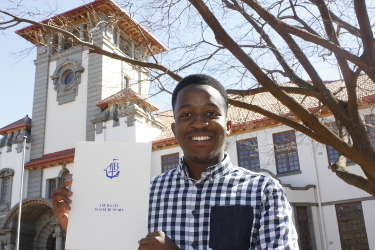Latest News Archive
Please select Category, Year, and then Month to display items
10 March 2022
|
Story Anthony Mthembu
|
Photo Unsplash
 The No Student Hungry team gearing up to start distributing food parcels to the selected students.
The No Student Hungry team gearing up to start distributing food parcels to the selected students.
The UFS is one of the many institutions of higher learning where food insecurity is an active issue. However, the
No Student Hungry Programme is one of the initiatives launched at the university to assist in fighting food insecurity at the institution.
The purpose of the programme
Since its inception in 2011, the initiative has assisted many students in acquiring a healthy meal. Additionally, the Food Environment Office also hands out food packages, so that students can continue to achieve academically. “We are trying to develop a healthy environment for students and make it easier for them to have a nice and healthy meal,” stated Annelize Visagie, who heads the Food Environment Office at the UFS. The Food Environment programme is spread out on all three campuses, each with its own facilitators. Furthermore, the programme mainly caters for students who are not funded by the National Student Financial Aid Scheme (NSFAS) but who are excelling academically. The abovementioned students apply for assistance online, and a list is then drawn up of students who receive assistance for the year.
Alternative solutions to keep the initiative running
On the Bloemfontein Campus, the No Student Hungry Programme will be catering for 200 students in the 2022 academic year, assisting them with a daily nutritious meal. Additional food parcels are also handed out to provide further assistance. “We give food parcels to the students on the list every Tuesday and Thursday at the Thakaneng Bridge,” Visagie highlighted. However, she argues that catering for the student population through this programme can be a challenge, as the demand for assistance is growing rapidly and the ability to assist is limited. The programme relies on partnerships and sponsors to assist the student body. In fact, the coordinators of the programme currently have a memorandum of understanding with Tiger Brands according to which they deliver around 100 food parcels for distribution.
In addition, the coordinators have put in place alternative measures to ensure that they can provide more food to students. “The
Kovsie Act Office, in partnership with the
Department of Sustainable Food Systems and Development, has started a food garden where healthy and nutritious produce are grown, in order to add value to the distribution,” she indicated. Although the programme can only assist to a point, students who are in desperate need of assistance are never turned away. In fact, the
Social Support Unit at Thakaneng Bridge usually assists students with food vouchers for a maximum of four days.
A commitment to teaching healthy eating habits
The programme is not only committed to curbing food insecurity, but also to ensuring that students have a healthy and balanced diet. As such, a booklet is being issued by the
Department of Nutrition and Dietetics in collaboration with the Department of Sustainable Food Systems and Development, which contains ways in which students can make a healthy meal using some of the ingredients offered in the food parcels.
“We want to teach students how to eat healthy in the cheapest way, because they don’t have a lot of money to buy expensive food products,” Visagie argued.
Perseverance is key for 2017 Abe Bailey recipient
2017-08-23

Gosego Moroka, recipient of the 2017 Abe Bailey Travel Bursary,
says his never-say-die attitude is what helped him win the bursary
the second time round.
Photo: Rulanzen Martin
A valuable life lesson can be learned from Gosego Moroka. The fourth-year LLB student was in the top three for the 2016 Abe Bailey Travel Bursary which was awarded to Candice Thickeson. And now in 2017 Moroka is the recipient.
“It means the world to me as it shows that perseverance is the key. I took last year’s loss as a lesson which I would use to improve as a candidate this year and I’m ecstatic that it came full circle.”
Bursary aims to broaden views
The educational tour will start on 21 November 2017. “We will be travelling to the African Union in Addis Ababa, Ethiopia, and then to London, Oxford and Cambridge universities in England, as well as Edinburgh University in Scotland,” Moroka says. The tour group will be hosted by Goodenough College in England. The bursary aims to broaden the views of young South Africans by providing outstanding students the opportunity to engage with students from other universities.
Comprehensive application process
The application process starts with a motivation letter by the applicants stating the reason for applying. They must then submit letters detailing their leadership roles in the community, school, and at university. This is followed by an interview process. “The university will recommend three persons as possible bursars,” Moroka says. The Abe Bailey Trust will then, with the recommendation of the university, make its own decision in selecting the successful candidate.
Great achievement adds to repertoire
“This achievement was extremely important to me as it is testament that greatness is something one works towards.” Moroka is a former 100m South African champion and is part of the Golden Key International Honour Society. And now he is an Abe Bailey Bursar.